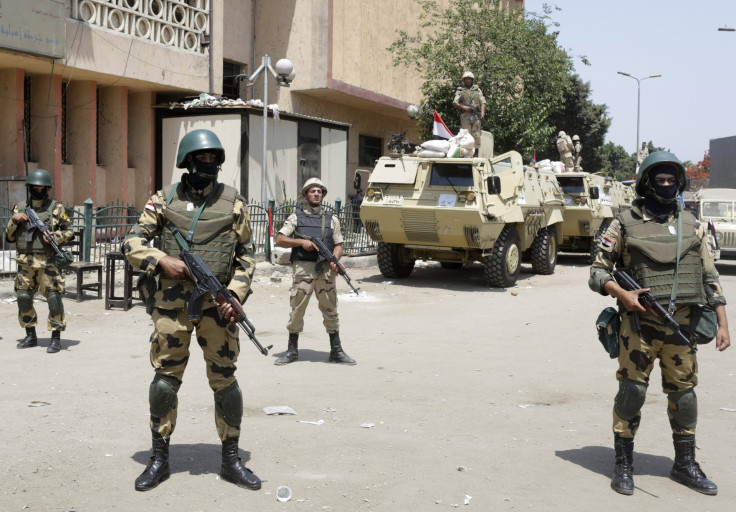Egypt's Sisi Extends Reach Of Military Courts Reminiscent Of Mubarak Era

Egyptian President Abdel Fattah el-Sisi has passed a law that extends the reach of the country's military courts and places all "public and vital facilities under military jurisdiction for the next two years and directs state prosecutors to refer any crimes at those places to their military counterparts," according to a report released by Human Rights Watch Monday. The new law allows for the militarization of prosecution of protesters and other government opponents -- a mandate similar to those implemented during the reign of former President Hosni Mubarak, who was ousted in February 2011 at the start of the Arab Spring.
Under Mubarak, Egypt's military arrested nearly 12,000 civilians for various charges, including inciting violence at protests, during the revolution in 2011, and brought them before military tribunals. According to officials from the Supreme Council of the Armed Forces (SCAF), Egypt tried 11,879 civilians in military tribunals from Jan. 28 to Aug. 29, 2011. Of that number, more than 8,000 were convicted.
Now, under Sisi, Egypt is getting back to widespread civilian military trials. Sisi issued the new law just days after an attack in the Sinai Peninsula killed dozens of soldiers, the deadliest attack yet in an insurgency that has grown since the ousting of former President Mohammed Morsi by SCAF in July 2013. According to the Human Rights Watch report, since the ouster of Morsi, Egypt's military courts have tried at least 140 civilians. It is still unclear what charges each individual faced, but many were arrested during protests against Morsi's removal from power.
“This law represents another nail in the coffin of justice in Egypt,” Sarah Leah Whitson, Middle East and North Africa director, said in the report. “Its absurdly broad provisions mean that many more civilians who engage in protests can now expect to face trial before uniformed judges subject to the orders of their military superiors.”
Sisi's crackdown on civilian protestors started earlier this year during the beginning of the school semester. Egyptian police officers armed with tear gas canisters stormed lecture halls at Alexandria University, arresting and wounding dozens. Students at other universities such as Bani Swaif and Assuit were also protesting the removal of Morsi. In one weekend, Egyptian police officers arrested more than 90 students. On Nov. 16, a criminal court in Cairo referred five students from al-Azhar University to the military because of their involvement in the protests. The students have been charged with joining a terrorist organization, displaying force, threatening to use violence, possession of Molotov cocktails and vandalism, according to Human Rights Watch.
“This new decree is pernicious and contrary to basic standards of justice,” Whitson said in the report. “Egypt’s authorities should annul all the military court verdicts against civilians handed down since the new government took power, and President el-Sisi needs to act quickly to amend his decree.”
Historically, Egypt's military has influenced politics. Mubarak formed strong ties between his administration and SCAF, relying on the army to take over most of the security in the country. The military, in essence, replaced the police forces. Since Mubarak's time in office, the military has remained in tact and has continued to influence the political process in Egypt. Sisi, like Mubarak, is supportive of SCAF and its power to rule in the streets.
© Copyright IBTimes 2025. All rights reserved.





















